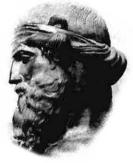|
|  Plato (427-347 B.C.) Plato (427-347 B.C.)
The great Greek philosopher Plato was most likely born in Athens to an aristocratic family, though little is known of his early life. He was a large, athletic, intelligent man, who could have succeeded in any number of callings — but he became a disciple of the great teacher, Socrates, and devoted himself chiefly to a life of the mind. He travelled widely, then sometime before 368 B.C. founded his own school, the Academy, at Athens, where he remained for the rest of his life, apart from a few visits to Syracuse.
Plato's life of thought was captured in a series of dialogues, most of them spotlighting his master Socrates. Readers wishing to jump into the Dialogues would do well to begin with the Apology, in which Socrates defends himself against the charges of atheism and teaching controversial ideas to the youth of Athens. The trial, or course, ended unsuccessfully for Socrates, and he was sentenced to death. In Crito, Socrates explains his reasons for refusing to escape from prison. Phaedo contains a discussion of immortality, but ends with Socrates' execution and is one of the most moving short pieces of narrative ever written. Next, one should read the early dialogues (those in the table of contents before the Republic). The main character is Socrates, and the main subject is the definition of moral concepts (e.g, temperance in Charmides, piety in Euthyphro, or courage in Laches. In the middle dialogues, Plato increasingly outlines his own teachings (e.g., the doctrine of learning as recollection in the Meno and his theory of forms in the Republic. The later dialogues, such as Parmenides and the Sophist are more didactic in nature and round out Plato's exposition of his ideas.
Plato's influence has been universal, prompting the 20th century mathematician-philosopher Alfred North Whitehead to comment that all subsequent philosophy is but a series of footnotes to Plato. His influence extends through his student and disciple Aristotle, even though the two disagreed in ways that have bearing on philosophy down to the present day. Through the movement known as Neoplatonism, Plato's influence has had a great impact on various streams of both secular philosophy and Christian theology.
- Dialogues (including The Republic, Laws, and the Seventh Letter)
The Classical Library,
© 2000.
|